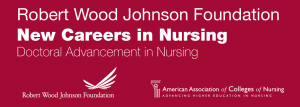Doctoral Advancement in Nursing Project
 The Doctoral Advancement in Nursing (DAN) project is designed to enhance the pipeline of future nurse leaders, faculty, and researchers by using strategies to identify, encourage, and support students interested in pursuing doctoral degrees. This important work focuses on graduates of accelerated and traditional nursing programs who come from groups underrepresented in nursing or from disadvantaged backgrounds. By establishing mentoring relationships, students will be guided through the application process into doctoral study and receive expert advice on identifying sources of financial support.
The Doctoral Advancement in Nursing (DAN) project is designed to enhance the pipeline of future nurse leaders, faculty, and researchers by using strategies to identify, encourage, and support students interested in pursuing doctoral degrees. This important work focuses on graduates of accelerated and traditional nursing programs who come from groups underrepresented in nursing or from disadvantaged backgrounds. By establishing mentoring relationships, students will be guided through the application process into doctoral study and receive expert advice on identifying sources of financial support.
Are you a potential doctoral student or considering doctoral study?
Readiness Self- Assessment for Doctoral Study
Have you ever considered pursuing a doctoral degree in nursing? Are you ready to take on another challenge that could further your career? Is it feasible with your current home situation to return to school? These are the types of questions that are being directed towards students of nursing who may be interested in a Doctor of Nursing Practice (DNP) or PhD in Nursing degrees. In order to assist those who may aspire to these terminal degrees, the Doctoral Advancement in Nursing (DAN) Project has put together a brief Student Self-Assessment to determine the willingness and readiness to pursue these degrees. Each question lays out a framework that leads a student down the path of self-reflection and gauges their level of interest in a post-graduate degree.
The Doctoral Advancement in Nursing (DAN) project is designed to enhance the pipeline of future nurse leaders, faculty, and researchers by using strategies to identify, encourage, and support students interested in pursuing doctoral degrees. This important work will focus on graduates of accelerated and traditional nursing programs who come from groups underrepresented in nursing or from disadvantaged backgrounds. By establishing mentoring relationships, students will be guided through the application process into doctoral study and receive expert advice on identifying sources of financial support.
The next step is to complete your profile and the Mentee Application Profile at ncin.chronus.com. Once your application is reviewed and accepted, you will be matched with a mentor.
Faculty Mentors - Doctoral Advancement in Nursing: Promising Practices for Supporting Academic Advancement to Doctoral Study
For Nursing Faculty who may be interested in becoming a DAN Mentor, we have hosted an informational webinar aimed at presenting promisign practices and proven successful strategies that nursing faculty may use to encourage and support their students' early entry into doctoral programs. A recording of this webinar can be found here.
Future mentors may proceed to the Mentor Application at ncin.chronus.com and clicking the "Join Now" button. There you may submit your application profile.
Mentoring Webinar for DAN Mentors
“Getting on the Right Page”; Best practices in mentoring with Dr. Lois Zachary. In this webcast, Dr. Zachary discusses the benefits of mentoring for both mentee’s and mentors, as well as the various approaches to the mentoring process, presented on Tuesday, December 10, 2013. The recording for this event can be found here, you can also view the powerpoint here as well the Q&A here.
DAN Project Resources:
DAN Whitepaper: Faculty shortages at nursing schools across the country are limiting student capacity at a time when the need for nurses continues to grow. Budget constraints, an aging faculty, and increasing job competition from clinical sites have contributed to this emerging crisis. The decline in the number of doctorally prepared nursing faculty is hampering efforts to adequately address the nation’s overall shortage of nurses. The 2011 Institute of Medicine Report, The Future of Nursing: Leading Change, Advancing Health recommended that nurses achieve higher levels of education to respond more effectively to the demands of an evolving health care system and the changing needs of patients. Specifically, this report recommended doubling the number of nurses with a doctoral degree by 2020 “to add to the cadre of nurse faculty and researchers, with attention to increasing diversity”. As stewards of the profession, more doctorally prepared nurses are needed to serve as role models, mentors, teachers, and leaders responsible for shaping how nurses are educated and how they practice.
DAN Faculty Toolkit:The purpose of this toolkit is to provide resources for nurse faculty who are advising undergraduate nursing students about potential future enrollment in post-baccalaureate study. The materials in the Toolkit are intended to provide information to faculty to be used in guiding students who are in the process of deciding whether to attend graduate school. Materials included can be used to assist the student with the application process and subsequent successful enrollment in graduate study.
DAN Student Toolkit: The purpose of this Toolkit is to provide resources for nurses who are considering applying and enrolling in either a Doctor of Nursing Practice (DNP) program or a Doctor of Philosophy (PhD) program. The materials in the Toolkit are intended to assist with information gathering and planning during the process of learning about the DNP and PhD programs. The Toolkit includes useful and practical knowledge to help you choose the right program. New materials will be added as new documents and information become available. Your feedback on the usefulness of the Toolkit, as well as your suggestions for other information, is welcome.
DAN Personal Journey to the PhD Take a moment to listen to the personal journey of Aara Amidi-Nouri, PhD, RN, Assistant Professor and Director of Diversity, School of Nursing, Samuel Merritt University. A touching telling of her path in nursing and why she decided that a PhD was in her future.
